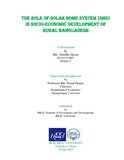| dc.contributor.advisor | Hoque, Professor Md. Nurul | |
| dc.contributor.author | Harun, Md. Abdulla | |
| dc.date.accessioned | 2016-02-29T16:04:42Z | |
| dc.date.available | 2016-02-29T16:04:42Z | |
| dc.date.copyright | 2015 | |
| dc.date.issued | 2015-07-30 | |
| dc.identifier.other | ID 13372007 | |
| dc.identifier.uri | http://hdl.handle.net/10361/5049 | |
| dc.description | This dissertation is submitted in partial fulfillment of the requirements for the degree of MA in Governance and Development, 2015. | en_US |
| dc.description | Cataloged from PDF version of thesis report. | |
| dc.description | Includes bibliographical references. | |
| dc.description.abstract | This research is an attempt to measure the impacts of Solar Home Systems (SHSs) and
their role in socio-economic development of rural Bangladesh. After a brief review of
previous research works on SHS’s importance, benefits and prospect, the study mainly
focuses on the issues of SHS’s impacts on socio-economic development. In this context,
the literature of SHS related works is reviewed and afterwards, the methods and
findings of an impact assessment study of SHSs in rural Bangladesh are described in
detail.
The study is based on data from a survey of 90 households from three villages in
Goffargoaw Upazilla of Mymensign district. From the research findings, some
recommendations for SHS dissemination programmes in Bangladesh are made.
The research concludes with the following major findings:
• Introduction of micro-financing increases the SHS dissemination programme in
remote rural areas of Bangladesh.
• The utilisation of SHS in rural area of Bangladesh exhibits clear positive
impacts. However, the economic impacts of the SHS are very limited as
households lack knowledge and proper training of diversified uses of SHS for
income generation activities.
• As compared to economic impacts, social impacts are more pronounced. It is
indeed true that improved household conditions for education, health, household
work, access to information, communication, entertainment, and perception on
safety bring about radical changes in the traditional social life and enhance
quality life of rural people. On household level, children and women are
benefited most as they spent most of their time within household premises using
solar electric lighting and household appliances. At the same time, a large
number of non-SHS households are being benefited indirectly from TV, radio,
mobile phone, laptop and studying facilities from SHS households.
• Positive environmental impacts are also observed as the substitution of
traditional lighting fuels save carbon dioxide emissions. But close monitoring of
the old batteries collection and recycling system is essential for ensuring
ecologically sustainable environment in rural area of Bangladesh. | en_US |
| dc.description.statementofresponsibility | Md. Abdulla Harun | |
| dc.language.iso | en | en_US |
| dc.publisher | BRAC University | en_US |
| dc.rights | BRAC University dissertation are protected by copyright. They may be viewed from this source for any purpose, but reproduction or distribution in any format is prohibited without written permission. | |
| dc.subject | MAGD | en_US |
| dc.subject | Solar Home System (SHS) | en_US |
| dc.subject | Rural Bangladesh | en_US |
| dc.title | The role of Solar Home System (SHS) in socio-economic development of rural Bangladesh | en_US |
| dc.type | Thesis | en_US |
| dc.contributor.department | BRAC Institute of Governance and Development, BRAC University | |
| dc.description.degree | M. Governance and Development | |

